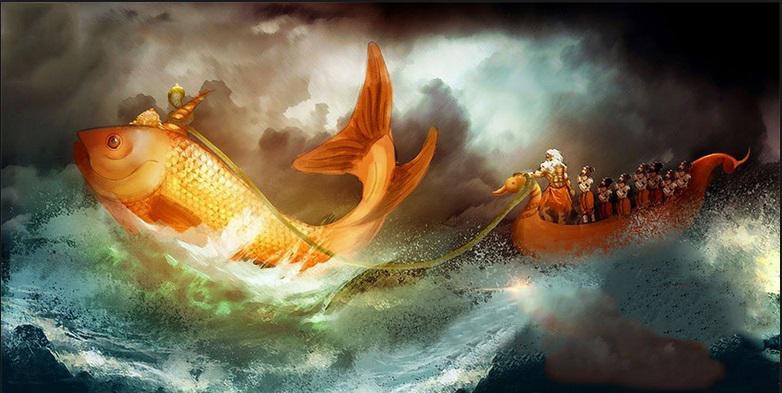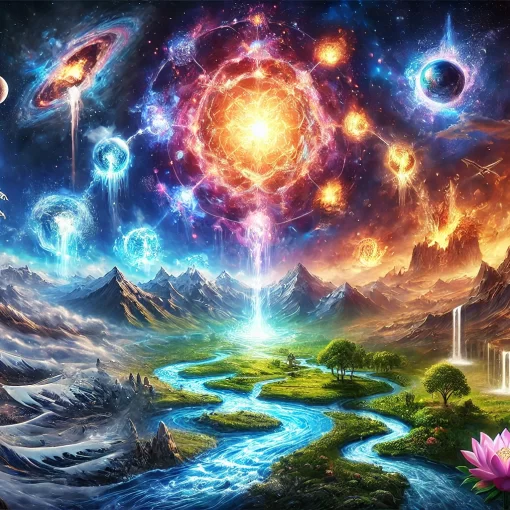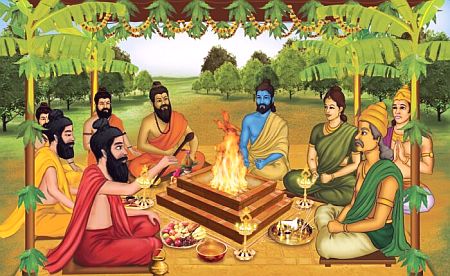How Humanity Derives Its Name from Manu – A Vedic Revelation
In a world teeming with etymologies, histories, and myths about the origins of mankind, there is one authoritative scriptural source that traces the very name “man” to its divine roots—the Śrīmad-Bhāgavatam. According to this sacred text, the name “man” is not a linguistic coincidence but a deeply spiritual designation that originates from a divine personality: Manu, the progenitor of mankind.
The Vedic tradition, rich with cosmological narratives and genealogical wisdom, offers us a perspective that is not only enlightening but also incredibly humbling. It places our human identity in the context of cosmic design, divine will, and sacred lineage.
Let us delve into this remarkable history and rediscover what it truly means to be called a “man”.
Who is Manu?
Manu is not a myth or symbolic metaphor; he is a real, powerful personality described in the Vedas and Purāṇas. He is the son of Lord Brahmā, the engineer of the universe, and the father of mankind.
The term “manuṣya”, commonly used in Sanskrit to refer to human beings, is derived from the word “Manu”, meaning “descendant of Manu.” Thus, when we refer to ourselves as humans or “man”, we are, in fact, referring to our lineage from this exalted personality.
In Śrīmad-Bhāgavatam (2.7.42), it is stated:
“We have already discussed his incarnation as Manu. The present age is the Vaivasvata Manu period, and each Manu has his different set of sons. In each of the fourteen Manus there are different kings, sages, demigods and incarnations of the Lord.”
This illustrates that Manu is not just one person, but rather a title given to fourteen great rulers who preside over different periods within a day of Lord Brahmā. Each Manu reigns for approximately 306,720,000 years, and during his reign, he oversees the administration of universal order, including the development of society, religious principles, and civilization itself.
We are currently living under the jurisdiction of the seventh Manu, known as Vaivasvata Manu, the son of the sun god Vivasvān. It is from him that we, the human race, derive our heritage and our name.
Bhagavad-gītā’s Confirmation of Manu’s Lineage
Lord Krishna Himself confirms this sacred lineage in the Bhagavad-gītā (4.1):
“I instructed this imperishable science of yoga to the sun-god Vivasvān. Vivasvān instructed it to Manu, the father of mankind, and Manu in turn instructed it to Ikṣvāku.”
Here, we see a divine lineage of knowledge transmission: Krishna → Vivasvān → Manu → Ikṣvāku. This spiritual wisdom—Bhagavad-gītā—descended through a paramparā (disciplic succession), beginning with Lord Krishna Himself. This clearly identifies Manu not only as a progenitor but also as a spiritual teacher, entrusted with divine truths.
Manu’s Divine Role in Universal Administration
Manu’s duties go far beyond mere population propagation. He is a lawgiver, administrator, and spiritual authority. The famous dharma-śāstra known as the Manu-smṛti is attributed to him, laying down the codes of conduct, governance, ethics, and social duties for humans.
This shows how intimately law, order, and morality are tied to our very identity as manuṣya, the descendants of Manu. Unlike modern conceptions that reduce “man” to just a rational animal, the Vedic view uplifts the identity of man to a divinely designed being with a sacred responsibility to uphold dharma.
A Tale of the First Human: Not Evolution, but Design
Modern science proposes the idea that human beings evolved from primitive life through a long chain of mutations and accidents. But the Vedic scriptures offer a vastly different, spiritually potent view.
Human life, according to Śrīmad-Bhāgavatam, did not evolve from animals, but was specially created by Lord Brahmā under the guidance of the Supreme Lord, and Manu was placed as the father to guide the human race. Manu’s descendants populated the earth, and from his example, society was taught how to live in harmony with nature, divine law, and the purpose of life.
Thus, instead of the randomness of evolution, we find divine intentionality at the heart of our existence. This view fills our human identity with meaning, responsibility, and hope.
What It Means to Be a Descendant of Manu
-
We are Spiritually Born: As descendants of Manu, we are not merely flesh and bone; we are spirit souls temporarily residing in a human body, with a divine purpose to realize our relationship with Krishna.
-
We are Meant to Follow Dharma: Our lineage is not ordinary. Manu’s role as a lawgiver means we are born into a tradition that reveres dharma—ethical and spiritual responsibility. Neglecting this is not just ignorance, but a betrayal of our sacred heritage.
-
We Are Meant to Receive Divine Knowledge: Just as Manu received the Bhagavad-gītā from the sun god, we too are recipients of that ancient divine wisdom, preserved through disciplic succession for our liberation.
Manu and the Flood: The Original Noah
Interestingly, the story of Vaivasvata Manu saving the sages and Vedic knowledge from a great flood is strikingly similar to the Biblical story of Noah. In the Bhāgavatam’s telling, Manu was guided by Lord Matsya (the Fish incarnation of Vishnu) to gather sages, seeds, and sacred texts into a boat. The Lord Himself protected the boat through the deluge, anchoring it to a mountain peak.
This symbolizes how divine intervention preserves human civilization not just biologically, but spiritually. The flood could wipe away material possessions, but Lord Vishnu ensured that knowledge, dharma, and consciousness survived through Manu.
Why This Knowledge Matters Today
In a world increasingly disconnected from its spiritual roots, this knowledge is like a blazing torch in the darkness. Knowing we are children of Manu, and thus caretakers of dharma, gives us a profound sense of purpose. The modern man may be confused, depressed, or driven by material goals, but the man who knows his origin from Manu is awakened to a higher reality.
When we understand that our true identity is not bound to race, nationality, or temporary success, but to an eternal legacy passed down from Lord Krishna to Manu, we begin to live with clarity, strength, and compassion.
Lessons and Reflections
-
Don’t see yourself as just another being among billions. You are a manuṣya, born from a divine lineage.
-
Your life has meaning—not to indulge in fleeting pleasures, but to awaken to your eternal nature and serve the Supreme Lord.
-
Just as Manu preserved the world through divine guidance, we too must preserve our spiritual heritage by living and sharing the teachings of the Vedas, Bhagavad-gītā, and Śrīmad-Bhāgavatam.
Call to Action



Let us not live as forgetful descendants. Let us rise, remember, and reclaim our spiritual birthright as sons and daughters of Manu, the servant of the Lord.




